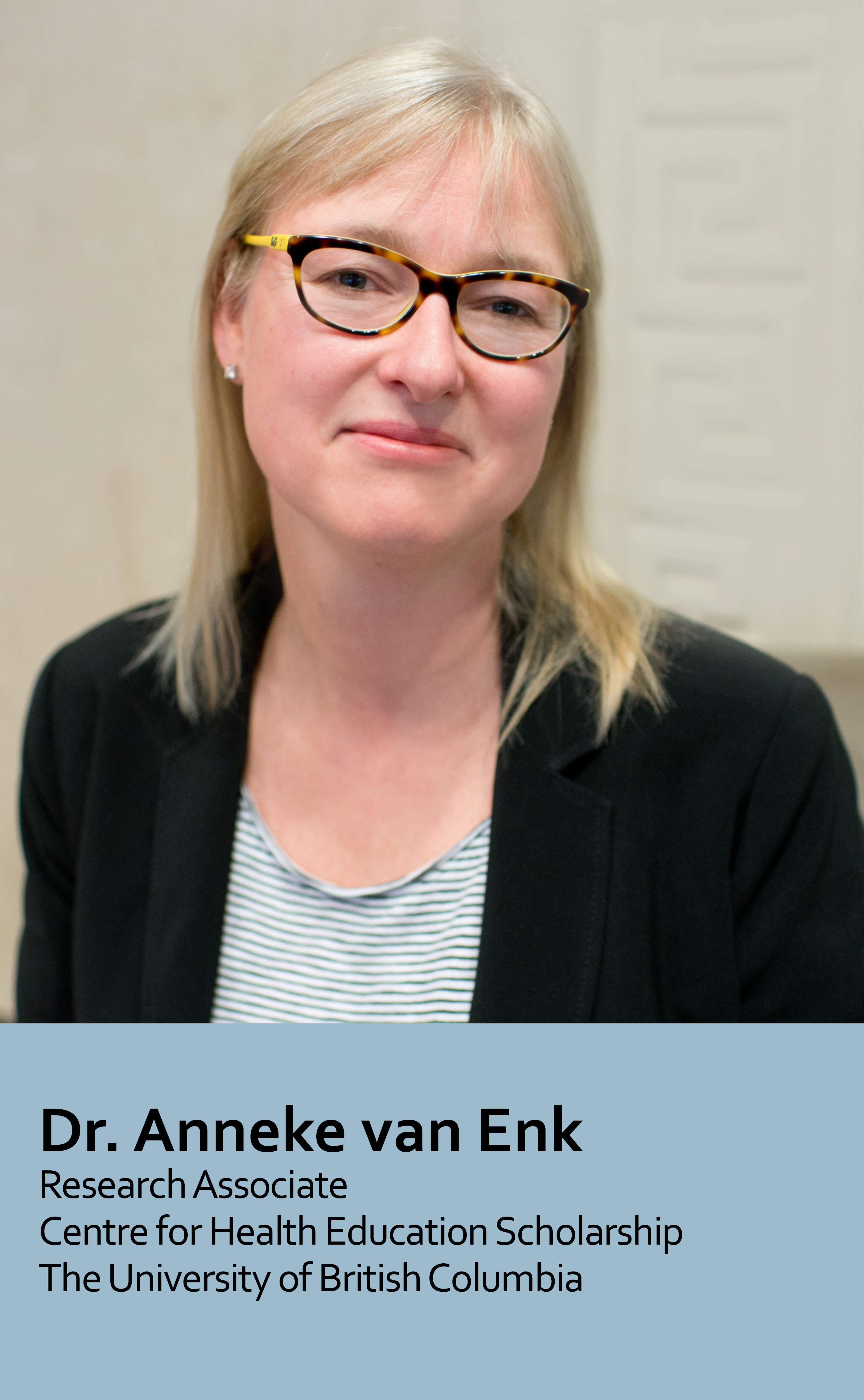Conducting and reporting on HPE research: Can we engage BOTH scholarly and practical interests?
Dr. Anneke van Enk

Date: Wednesday, September 20, 2017
Time: 12:00pm to 1:30pm (feel free to bring a bagged lunch)
Locations:
- DHCC 2267 (host venue)
- IRC 305
- RJH CA 120
- NHSC 9-374
Remote:
- Movi E, ID 30215
- Additional locations and video conference options are available. Please email ches.secretary@ubc.ca to process the request.
Objectives
-
Through participation in these events, participants should be able to:
1. Identify and challenge current thinking in health education research.
2. Relate concepts explored to practice for the purposes of improving education practices and informing educational innovations.
3. Relate concepts explored to their own scholarship.
Abstract
Education research has long struggled with tensions between scholarly and practical interests. Some have argued that these different interests are irreconcilable and that research will have to commit itself either to producing theoretical knowledge or to solving practical problems. Others are more sanguine, however, maintaining that research can be conducted in a way that is compelling for both scholars and practitioners, without the need to “translate” theory into practice after the research is complete. In this talk, I reflect on what it might mean for researchers in HPE to take up this more optimistic view. I first sketch out, in general terms, the assumptions and relationships that would obtain in such collaboratively conducted research. Then, I focus on the linguistic resources that would be needed to report on this research. I share findings from a recent study that looks at the research article as a communicative form in three contrasting areas of education research: medical education, early childhood education, and philosophy of education. I suggest that, although the research article has evolved historically to become the most familiar and prestigious genre in scholarly knowledge production, it may present challenges for education researchers who want their work to serve both scholarly and practical ends.
Biography
Dr. Anneke van Enk obtained her PhD in education from Simon Fraser University. Her doctoral research focused on literacy learners’ narratives of schooling and, more specifically, the use of interview-based methodologies to collect narrative data. Dr. van Enk has taught courses on academic writing, discourse analysis, narrative research, adult literacy, and digital literacy at the University of British Columbia. She has also run numerous academic writing workshops and has participated in various initiatives to support practice-based research in adult literacy education.
Dr. van Enk joined the Centre for Health Education Scholarship (CHES) as a research associate in 2015. The focus of her work is on ways of bringing language-related matters to the foreground in medical curricula. Dr. van Enk supports Faculty of Medicine members interested in qualitative, and specifically discourse analytic, approaches to education research, and she contributes further to CHES’s mandate by acting as a resource for members seeking writing support in the course of their scholarly activities in the field of medical education.
Accreditation:
The University of British Columbia Division of Continuing Professional Development (UBC CPD) is fully accredited by the Committee on Accreditation of Continuing Medical Education (CACME) to provide study credits for continuing medical education for physicians. This course has been reviewed and approved by the UBC Division of Continuing Professional Development. This Group Learning course meets the certification criteria of the College of Family Physicians of Canada and has been certified by UBC CPD for up to 1.5 Mainpro+ credits. This course is an Accredited Group Learning Activity eligible for up to 1.5 MOC Section 1 credits as defined by the Maintenance of Certification program of the Royal College of Physicians and Surgeons of Canada. Each physician should claim only those credits he/she actually spent in the activity.
